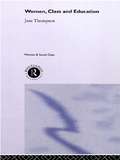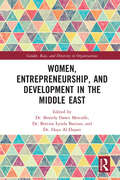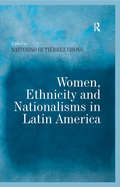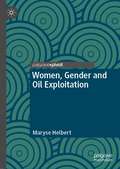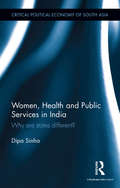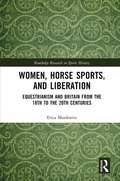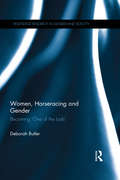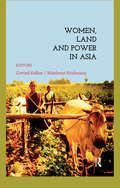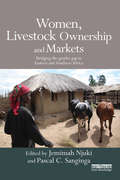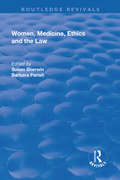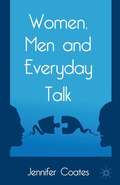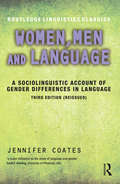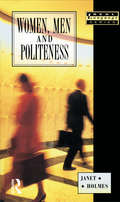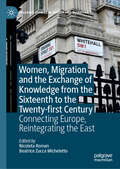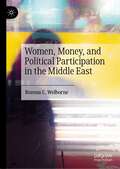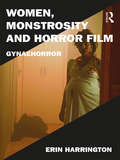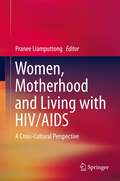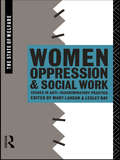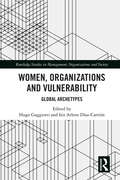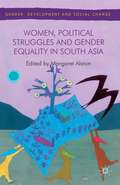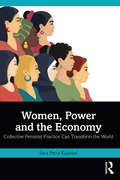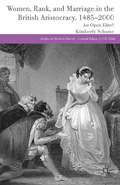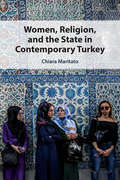- Table View
- List View
Women, Class And Education (Women And Social Class Ser.)
by Jane ThompsonMaking use of theory, reflection, narrativity and auto/biographical writing, Jane Thompson provides a comprehensive understanding of what learning really means, and what education can contribute to the struggles of working class women intent on changing the circumstances of their lives. Organized into three parts, in the first section, Thompson draws on autobiographical experience to root theoretical understanding in the authority of personal knowledge. In part two, she illustrates how theoretical analysis can inform arguments about women's changing relationships to class, community, consciousness and education. In the final part, she provides detailed examples of educational work she has been involved in with working class women. Containing vivid autobiographical narratives from women in England and Northern Ireland, Women, Class and Education explores compelling personal narratives that underline the importance of feminism as a source of political inspiration, social analysis and change.
Women, Entrepreneurship and Development in the Middle East (Gender, Race, and Diversity in Organizations)
by Beverly Dawn MetcalfeThe Middle East was the region least impacted in the 2008 crisis, has investment systems markedly different to the West, is largely governed by Islamic Shari’a, and has varying forms of governance and institutional organization, which are not understood by many, nor how these systems shape entrepreneurial and industrial development. While the Middle East as a region has seen a small growth in entrepreneurship for women, and business scholarship on the Middle East has grown, there is no text in English that has brought critical insights from the Middle East together in a single volume. In examining women’s entrepreneurship in the Middle East, this book aims to challenge Global North assumptions about the disempowering impacts of Islamic Shari’a and governance. Referring to the constraints of Islam on women’s subjectivity and agency greatly misunderstands religious identity, of both men and women, and the way in which public administration and private sector institutions are organized in very different ways to Western regions. This timely text expands and adds new insights to the theorizations of women’s entrepreneurship in the Middle East, through unravelling spatialized themes, and incorporates contemporary themes including: an Islamic science reading of women, work and venturing; changing families and entrepreneurship development; women managing social crises; Islamization, governance and women; Islamic feminist activisms and entrepreneurship; representations of women’s entrepreneurship on social media; and women’s collectives leading entrepreneurship via Facebook entrepreneurship. It will be of interest to researchers, academics, and students in the fields of entrepreneurship, gender, work and organizations.
Women, Entrepreneurship and Development in the Middle East (Gender, Race, and Diversity in Organizations)
by Beverly Dawn MetcalfeThe Middle East was the region least impacted in the 2008 crisis, has investment systems markedly different to the West, is largely governed by Islamic Shari’a, and has varying forms of governance and institutional organization, which are not understood by many, nor how these systems shape entrepreneurial and industrial development. While the Middle East as a region has seen a small growth in entrepreneurship for women, and business scholarship on the Middle East has grown, there is no text in English that has brought critical insights from the Middle East together in a single volume. In examining women’s entrepreneurship in the Middle East, this book aims to challenge Global North assumptions about the disempowering impacts of Islamic Shari’a and governance. Referring to the constraints of Islam on women’s subjectivity and agency greatly misunderstands religious identity, of both men and women, and the way in which public administration and private sector institutions are organized in very different ways to Western regions. This timely text expands and adds new insights to the theorizations of women’s entrepreneurship in the Middle East, through unravelling spatialized themes, and incorporates contemporary themes including: an Islamic science reading of women, work and venturing; changing families and entrepreneurship development; women managing social crises; Islamization, governance and women; Islamic feminist activisms and entrepreneurship; representations of women’s entrepreneurship on social media; and women’s collectives leading entrepreneurship via Facebook entrepreneurship. It will be of interest to researchers, academics, and students in the fields of entrepreneurship, gender, work and organizations.
Women, Ethnicity and Nationalisms in Latin America
by Natividad Gutiérrez ChongThe relationship between gender and nationalism is a compelling issue that is receiving increasing coverage in the scholarly literature. With case studies covering Argentina, Ecuador, Bolivia and Mexico, this is the first book to explore these links in the context of Latin America. It includes contributions from Latin American scholars to offer a unique and revealing view of the most important political and cultural issues. The work opens by outlining four dimensions in the relationship between gender and nationalism. These are: the contribution of women to nation building and their exclusion from it by the state and its institutions; the role of women in contemporary ethnic and nationalist movements; the place of the female body in the myths and traditions surrounding the nation; and the role of women in forging the intellectual and artistic culture of the nation. It then provides both theoretical and empirical explorations of these themes, with chapters covering the debate on multiculturalism and gender in the construction of the nation, the struggles of ethnic women to participate politically in their communities and studies of the first Mexican filmmaker, Mimi Derrba and the indigenous heroine Dolores Cacuango from Ecuador.
Women, Gender and Oil Exploitation (Gender, Development and Social Change)
by Maryse HelbertThis book examines the gender dimensions of large-scale mining in the oil industry and how oil exploitation has produced long-term economic, political, social and environmental risks and benefits in developing countries. It also shows that these risks and benefits have been unequally distributed between women and men. This project maps the ongoing dialogue between women’s issues and resource management, particularly, oil. The author attempts to answer the following questions: What are the impacts of oil projects on women in oil-rich countries? How can these impacts be explained? How can these impacts be reduced?
Women, Health and Public Services in India: Why are states different? (Critical Political Economy of South Asia)
by Dipa SinhaWhy are inter-state differences in human development in India so high? What explains regional patterns where overall the southern region has some of the best human development outcomes in the country while the states in the northern ‘heartland’ have the worst? In addressing these important questions, this volume provides a detailed analysis of health outcomes in India, especially its effects on women. It offers insights into how multiple factors affecting human development, in particular health, play out differently in various socio-cultural and economic contexts. This book will interest scholars and researchers of sociology, development studies, gender studies, economics, public policy as well as general readers.
Women, Horse Sports and Liberation: Equestrianism and Britain from the 18th to the 20th Centuries (Routledge Research in Sports History)
by Erica MunkwitzThis book is the first, full-length scholarly examination of British women’s involvement in equestrianism from the eighteenth through the twentieth centuries, as well as the corresponding transformations of gender, class, sport, and national identity in Britain and its Empire. It argues that women’s participation in horse sports transcended limitations of class and gender in Britain and highlights the democratic ethos that allowed anyone skilled enough to ride and hunt – from chimney-sweep to courtesan. Furthermore, women’s involvement in equestrianism reshaped ideals of race and reinforced imperial ideology at the zenith of the British Empire. Here, British women abandoned the sidesaddle – which they had been riding in for almost half a millennium – to ride astride like men, thus gaining complete equality on horseback. Yet female equestrians did not seek further emancipation in the form of political rights. This paradox – of achieving equality through sport but not through politics – shows how liberating sport was for women into the twentieth century. It brings into question what “emancipation” meant in practice to women in Britain from the eighteenth through twentieth centuries. This is fascinating reading for scholars of sports history, women's history, British history, and imperial history, as well as those interested in the broader social, gendered, and political histories of the nineteenth and twentieth centuries, and for all equestrian enthusiasts.
Women, Horseracing and Gender: Becoming 'One of the Lads' (Routledge Research in Gender and Society)
by Deborah ButlerHow do the class and gender inequalities found in horseracing affect the working practices of women within the industry? Drawing on the work of Bourdieu and his concepts of field, capital and habitus, this book shows the inequalities that are prevalent within the world of racing, both historically and currently, by illustrating the classed and gendered nature of racing and how it has developed since the eighteenth century when it was the sport of the aristocracy. Using research obtained through her year-long ethnographic study of a racing yard, Deborah Butler demonstrates that the racing field is an arena of power conflicts, and that men and women who work in racing acquire a contradictorily gendered racing habitus. This is achieved by learning certain elements in a formal setting but mainly informally, by ‘doing’, developing practical skills and participating in a (gendered) community of practice. For female stable staff this means adapting their behaviour and working practices in order to be accepted as ‘one of the lads’. This book will appeal to both scholars and students of the sociology of sport, the sociology of work and gender studies.
Women, Land and Power in Asia
by Govind Kelkar; Maithreyi KrishnarajAcross the world women constitute an integral part of the agricultural sector. This volume is based on feminist responses to farming women’s struggle for economic rights and social justice in Asia, and seeks to provide a greater understanding of the development consequences of women’s marginal, limited ownership rights to land and other productive assets. Using comprehensive analyses, quantitative and qualitative data, and case studies from India, China, Bangladesh, Bhutan, Nepal, and other countries of the Asia-Pacific region, this volume brings together scholars and activists engaged with women’s unmediated entitlement to land and productive assets. While generally taking a position in favour of asset redistribution, the volume addresses two major issues: first, the conflict between legal measures and socio-cultural norms, in a context where laws that seek to secure gender equality and women’s economic empowerment are often overruled by norms that favour men; and second, how changes in the global economy in relation to traditional farming practices have adversely impacted women’s rights, especially in regions where they previously enjoyed more customary rights in asset control and management. The book draws attention to issues of economic security, gender equitable access to resources and asset-building, human rights and law, land-based livelihoods, caste and ethnic diversity, and voices in the women’s movements.This book will be useful to policy makers, civil society organisations, researchers and students of gender and women’s studies, development studies, sociology, economics and agriculture.
Women, Livestock Ownership and Markets: Bridging the Gender Gap in Eastern and Southern Africa
by Jemimah Njuki Pascal C. SangingaThis book provides empirical evidence from Kenya, Tanzania and Mozambique and from different production systems of the importance of livestock as an asset to women and their participation in livestock and livestock product markets. It explores the issues of intra-household income management and economic benefits of livestock markets to women, focusing on how types of markets, the types of products and women’s participation in markets influence their access to livestock income. The book further analyses the role of livestock ownership, especially women’s ownership of livestock, in influencing household food security though increasing household dietary diversity and food adequacy. Additional issues addressed include access to resources, information and financial services to enable women more effectively to participate in livestock production and marketing, and some of the factors that influence this access. Practical strategies for increasing women’s market participation and access to information and services are discussed. The book ends with recommendations on how to mainstream gender in livestock research and development if livestock are to serve as a pathway out of poverty for the poor and especially for women.
Women, Medicine, Ethics and the Law
by Susan Sherwin and Barbara ParishThis title was first published in 2002: A collection of articles focused on women within a general study of medicine, ethics and the law. Topics covered include: areas where the institutions of medicine, ethics and the law intersect in women's reproductive and sexual lives; the impact of legal policies and dominant ethical beliefs on many aspects of women's health; and the health practices and policies of bioethics and health law. The editors recognise that it is important not to lose sight of social differences other than gender, such as race, ethnicity, class, age, sexuality, religion, level of physical and mental ability, and family relationships. In their approach they seek to consider the lives and experiences of women as primary. Hence, they focus on the question of how women's encounters with the health-care system are structured by gender and other socially significant dimensions of their lives (rather than the question of how women differ from the male "norm").
Women, Men And Everyday Talk
by Jennifer CoatesBringing together a selection of some of the author's key papers on language and gender, this book provides an overview of the development of language and gender studies over the last 30 years, with particular emphasis on conversational data and on single sex friendship groups.
Women, Men and Language: A Sociolinguistic Account of Gender Differences in Language (Routledge Linguistics Classics)
by Jennifer CoatesWomen, Men and Language has long been established as a seminal text in the field of language and gender, providing?an account of the many ways in which language and gender intersect. In this pioneering book, bestselling author Jennifer Coates explores linguistic gender differences, introducing the reader to a wide range of sociolinguistic research in the field. Written in a clear and accessible manner, this book introduces the idea of gender as a social construct, and covers key?topics such as conversational practice, same sex talk, conversational dominance, and children’s acquisition of gender-differentiated language, discussing the social and linguistic consequences of these patterns of talk. Here reissued as a Routledge Linguistics Classic, this book contains a brand new preface which situates this text in the modern day study of language and gender, covering the postmodern shift in the understanding of gender and language, and assessing the book’s impact on the field. Women, Men and Language continues to be essential reading for any student or researcher working in the area of language and gender.
Women, Men and Politeness (Real Language Series)
by Janet HolmesWomen, Men and Politeness focuses on the specific issue of the ways in which women and men express politeness verbally.Using a range of evidence and a corpus of data collected largely from New Zealand, Janet Holmes examines the distribution and functions of a range of specific verbal politeness strategies in women's and men's speech and discusses the possible reasons for gender differences in this area. Data provided on interactional strategies, 'hedges and boosters', compliments and apologies, demonstrates ways in which women's politeness patterns differ from men's, with the implications of these different patterns explored, for women in particular, in the areas of education and professional careers.
Women, Migration and the Exchange of Knowledge from the Sixteenth to the Twenty-first Century: Connecting Europe, Reintegrating the East (Palgrave Studies in Gender and Migration)
by Nicoleta Roman Beatrice Zucca MichelettoThis book examines female migration between Eastern and Western Europe from the sixteenth to the twentieth century. Bringing together contributions from scholars working in diverse disciplines, the book focuses on the social, economic, and cultural exchanges between migrants and the inhabitants of their host countries, arguing that women were central to these interactions due to their commercial, artisanal, and intellectual skills. The chapters shed light on the various roles and professions that women undertook when migrating across Europe, providing case studies of governesses, domestic servants and caregivers, traders and merchants, doctors and scholars, and emphasising how these roles shaped their identities. The authors illustrate how social mobility was engendered by skilled migration and academic mobility, whilst also illuminating the prejudices and challenges that faced women as they attempted to integrate into their new host societies alongside their families. Taking a comparative approach to explore the experiences of migrants across a range of countries in Europe, and over a vast period from the Habsburg, Ottoman, and Russian Empires up until today, this collection provides insights into the long history of migration between Eastern and Western Europe. Nicoleta Roman is a researcher at the &‘Nicolae Iorga&’ Institute of History of the Romanian Academy and at New Europe College- Institute for Advanced Study, both in Bucharest, Romania. Her research interests revolve around social and economic history, gender and the history of women and children in (pre)modern Romania and Southeastern Europe. Beatrice Zucca Micheletto is a researcher in the Department of Cultures, Politics and Society at the University of Turin, Italy where she teaches Economic History of Migration. Her research focuses on economic and social history, women and gender history, migration history and labour history of early modern and modern Europe inItaly and France.
Women, Money, and Political Participation in the Middle East
by Bozena C. WelborneThis book examines women, money, and political participation in the Middle East and North Africa focusing on women’s capacity to engage local political systems. In particular, it considers whether and how this engagement is facilitated through specific types of financial flows from abroad. Arab countries are well-known rentier states, and so a prime destination for foreign aid, worker remittances, and oil-related investment. Alongside other factors these external monies have elicited dramatic shifts in gender-related social norms and expectations both from the state and the domestic population, affording certain women the opportunity to enter the political arena, while leaving others behind. The research presented here expands the discussion of women in rentier political economy and highlights their roles as participants and agents within regional templates for economic development.
Women, Monstrosity and Horror Film: Gynaehorror (Film Philosophy at the Margins)
by Erin HarringtonWomen occupy a privileged place in horror film. Horror is a space of entertainment and excitement, of terror and dread, and one that relishes the complexities that arise when boundaries – of taste, of bodies, of reason – are blurred and dismantled. It is also a site of expression and exploration that leverages the narrative and aesthetic horrors of the reproductive, the maternal and the sexual to expose the underpinnings of the social, political and philosophical othering of women. This book offers an in-depth analysis of women in horror films through an exploration of ‘gynaehorror’: films concerned with all aspects of female reproductive horror, from reproductive and sexual organs, to virginity, pregnancy, birth, motherhood and finally to menopause. Some of the themes explored include: the intersection of horror, monstrosity and sexual difference; the relationships between normative female (hetero)sexuality and the twin figures of the chaste virgin and the voracious vagina dentata; embodiment and subjectivity in horror films about pregnancy and abortion; reproductive technologies, monstrosity and ‘mad science’; the discursive construction and interrogation of monstrous motherhood; and the relationships between menopause, menstruation, hagsploitation and ‘abject barren’ bodies in horror. The book not only offers a feminist interrogation of gynaehorror, but also a counter-reading of the gynaehorrific, that both accounts for and opens up new spaces of productive, radical and subversive monstrosity within a mode of representation and expression that has often been accused of being misogynistic. It therefore makes a unique contribution to the study of women in horror film specifically, while also providing new insights in the broader area of popular culture, gender and film philosophy.
Women, Motherhood and Living with HIV/AIDS: A Cross-Cultural Perspective
by Pranee LiamputtongThere are about 34 million people worldwide living with HIV/AIDS. Half are women. There has been a dramatic global increase in the rates of women living with HIV/AIDS. Among young women, especially in developing countries, infection rates are rapidly increasing. Many of these women are also mothers with young infants. When a woman is labeled as having HIV, she is treated with suspicion and her morality is being questioned. Previous research has suggested that women living with HIV/AIDS can be affected by delay in diagnosis, inferior access to health care services, internalized stigma and a poor utilization of health services. This makes it extremely difficult for women to take care of their own health needs. Women are also reluctant to disclose their HIV-positive status as they fear this may result in physical feelings of shame, social ostracism, violence, or expulsion from home. Women living with HIV/AIDS who are also mothers carry a particularly heavy burden of being HIV-infected. This unique book attempts to put together results from empirical research and focuses on issues relevant to women, motherhood and living with HIV/AIDS which have occurred to individual women in different parts of the globe. The book comprises chapters written by researchers who carry out their projects in different parts of the world, and each chapter contains empirical information based on real life situations. This can be used as evidence for health care providers to implement socially and culturally appropriate services to assist individuals and groups who are living with HIV/AIDS in many societies. The book is of interest to scholars and students in the domains of anthropology, sociology, social work, nursing, public health & medicine and health professionals who have a specific interest in issues concerning women who are mothers and living with HIV/AIDS from cross-cultural perspective.
Women, Oppression and Social Work: Issues in Anti-Discriminatory Practice (The\state Of Welfare Ser.)
by Mary Langan Lesley DayFirst published in 1992. Routledge is an imprint of Taylor & Francis, an informa company.
Women, Organizations and Vulnerability: Global Archetypes (Routledge Studies in Management, Organizations and Society)
by Isis Arlene Díaz-Carrión Hugo GaggiottiWhy are women, despite being resilient, adaptable, and persistent, often constructed and perceived as weak and vulnerable? Women’s vulnerability is not a neutral concept but is organizationally defined and understood. Organizations are discursive spaces where women’s vulnerability is constructed and reproduced as a communicative act and event. We often represent vulnerability at individual or organizational levels, but not both. Women’s vulnerability reminds us of the pervasive interconnectedness of personal and organizational life events. Experiencing women’s organizational vulnerability is common. However, is women’s vulnerability publicly represented, defined, felt and acted upon in the same way everywhere?This book is focused on comparing women’s organizational vulnerability practices making a significant contribution to reflection, theory, methods and cross-disciplinary expertise. The process of making sense of “vulnerability” is extremely diverse and intersectionally constructed through gender, culture and organizational discourses, which demands complex, innovative and non-Eurocentric methodological paradigms and approaches. This book satisfies these demands by integrating contributions from a diverse range of disciplines, academic traditions and cases and provides an understanding of women’s vulnerability as a global phenomenon that comprises both cultural and organizational contexts.By examining how publicly and organizationally women develop particular and creative strategies to navigate vulnerability, the book significantly contributes towards identifying archetypical practices for negotiating vulnerability in different contexts.
Women, Political Struggles and Gender Equality in South Asia
by Margaret AlstonA brutal gang-rape of a young woman in India in 2012 caused a global outcry against rising brutal violence against women. In response to the young woman's death and the protests that followed, the contributors analyze the position of women in South Asia, the issue of violence, women's political activism and gender inequalities.
Women, Political Struggles and Gender Equality in South Asia (Gender, Development and Social Change)
by M. AlstonA brutal gang-rape of a young woman in India in 2012 caused a global outcry against rising brutal violence against women. In response to the young woman's death and the protests that followed, the contributors analyze the position of women in South Asia, the issue of violence, women's political activism and gender inequalities.
Women, Power and the Economy: Collective Feminist Practice Can Transform the World
by Inca Petra KuenkelIn the complex landscapes of multiple global crises, the book unfolds as a panoramic journey through the intricate pathways of women and power, weaving a tapestry that transcends crises and ushers in a transformative vision of a just world.Against the backdrop of a patriarchal history steeped in autocratic power practices, the author urges us to recognize, understand and redefine power in its myriad forms for collective feminist power practices. With meticulous analysis, she unveils challenges posed by the patriarchal backlash, exposing the normalized male definitions of power and the societal structures that sustain pathological power relationships. The narrative of the book intertwines power, economy and patriarchy, laying bare the many traps for complicity with the patriarchal systems. The author advocates for a paradigm shift, emphasizing the role of female memories and genealogies as foundational elements for a collective feminist practice. Power, in this context, emerges not as a force for dominance but as the ability to make a positive impact, flourishing in the rich diversity of differences. The envisioned future is one where societies thrive on commons, planetary care, feminist economies and pluriversality. The narrative charts a course toward a feminist democracy, rooted in nurturing the planet and safeguarding future generations. Governance and networks stand as keystones in shaping these utopian landscapes, where pioneers and movements play vital roles in sculpting the contours of tomorrow.The book offers practical tools for strengthening collective feminist practices that can restructure power pathologies. It unfolds as a captivating vista, where the echoes of the past harmonize with the aspirations of a feminist future.
Women, Rank, and Marriage in the British Aristocracy, 1485–2000
by Kimberly SchutteThrough an analysis of the marriage patterns of thousands of aristocratic women as well as an examination of diaries, letters, and memoirs, this book demonstrates that the sense of rank identity as manifested in these women's marriages remained remarkably stable for centuries, until it was finally shattered by the First World War.
Women, Religion, and the State in Contemporary Turkey
by Chiara MaritatoTracing the centrality of women in the definition of Turkish secularism, this study investigates the 2003 decision to increase the number of women officers employed by the Presidency of Religious Affairs (Diyanet). It explores how, as professional religious officers, the female Diyanet preachers epitomize a pious, modern and highly educated woman whose role in society has been raised to prominence. Based on extensive fieldwork in Turkey, and drawing on a rich ethnography of the activities conducted by Diyanet women preachers in Istanbul, Chiara Maritato disentangles the state's attempt to standardize a multifaceted female religious participation. <P><P>In using the feminization of the Diyanet as a prism through which to understand the significance of a renewed presence of Islam in the Turkish public realm, she casts light on a broader reformulation of religious services for women and families in Turkey, and pinpoints how this pervasive moral support has been able to penetrate and reshape even secular spaces.
